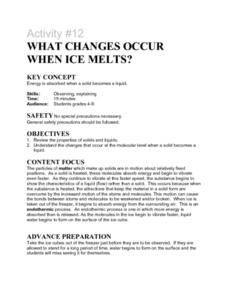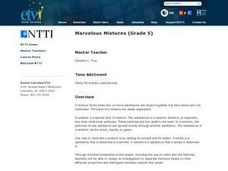Curated OER
Melt the Ice
Students examine and discuss how water changes from a liquid to a solid to a gas. They explore this concept by having an ice cube race, competing to see which group can change the solid water back into liquid water first.
Curated OER
A Model of a Scanning Tunneling Microscope
Ninth graders explain how a scanning tunneling microscope works. In this chemistry lesson, 9th graders construct atomic models and simulate how their images appear under the STM. They discuss the limitations of their atomic model.
Curated OER
Magnifiers
Students describe how several different objects magnify a provided sentence and decide if they are good magnifiers or not. They then write a sentence describing two properties an object must have in order to be a good magnifier.
Curated OER
Water and Ice
Students study the liquid and solid states of water. In this water states lesson, students complete three experiments to study water as it cycles from a liquid state to a solid state and back. Students finish with a Venn Diagram...
Curated OER
Project Geode
Pupils predict the appearance of a geode's internal structure based on its mass and density. They form a hypothesis based on the data they collect. They also identify common minerals found in Illinois.
Curated OER
Properties of Air
Students conduct investigations to demonstrate and learn that air takes up space, and puts pressure, or pushes, on everything around it. They conduct experiments to learn about feeling air pressure and measuring air pressure. Prior to...
Curated OER
The Same but Different Part II
Third graders experiment with beakers of water and balloons to measure the volume of the gas in the balloon. They determine ways to change the volume of air in the balloon which changes its size but not its physical state. By heating the...
Curated OER
What Changes Occur When Ice Melts?
Students explore the physical process of melting. They observe melting ice and answer questions related to energy transfer during phase changes.
Curated OER
Conservation of Mass
In this conservation of mass worksheet, students design an investigation to demonstrate the Law of Conservation of Mass. Students describe their investigation, collect data, graph the data and write a conclusion about what they discovered.
Curated OER
Balloons: Math with the Montgolfier Balloon
Students discover the history of hot air balloons by watching one ascent. For this physics lesson, students utilize a Montgolfier Hot Air Balloon from an earlier lesson and record the temperature, rate of ascent and the volume....
Curated OER
Lemon Batteries Revised
Fifth graders investigate how chemical energy in food and batteries is potential or stored energy. They discuss how batteries function, and create a class list of different forms of energy. Students then create a lemon battery that...
Curated OER
Making Molecules
In this making molecules worksheet, learners complete a table of elements with their symbol, atomic number, atomic mass, number of protons, number of electrons, period and group. Students then make models using pipe cleaners and beads of...
Curated OER
Solution Shapes
In this solutions worksheet, students soak a pipe cleaner in hot water and a supersaturated solution of 20 Mule Team Borax. Kids leave their pipe cleaner in the solution for 30 minutes and then observe. They put it back in over night and...
Curated OER
Conservation of Energy
Fifth graders identify situations in which kinetic and potential energy are exchanged and identify the direction of energy transfer using marbles and flexible foam track. They observe how the marbles move spontaneously when released...
Curated OER
Will the Lights Go Out?
Students diagram nuclear power plant, describe process for generating electrical power, discuss nuclear disasters in the 20th century, and draw conclusion about value of nuclear power for the future.
Curated OER
Properties of Magnetic Forces
Students explore what a magnetic force is and what kinds of objects are attracted to a magnet. They use a magnet to sort objects taht are and are not attracted to a magnet. Students then explain why the objects were or were not...
Curated OER
Marvelous Mixtures
Fifth graders design an experiment in which they separate mixtures. In this mixtures lesson plan, 5th graders define mixtures, solutions, solutes, and solvents. They watch a video, complete worksheets, and perform an experiment to...
Curated OER
What happens to water before we use it?
Students examine how water is treated prior to becoming available for human consumption. In this water treatment lesson, students conduct an experiment in which they filter water. Students formulate a hypothesis, test, analyze data, and...
Michigan Sea Grant
Food Chains and Webs
Starting with a simple food chain, young scientists interpret the difference and interrelatedness between herbivores, carnivores and producers. They answer questions related to cause and effect of food chain disruptions, including the...
Curated OER
Water Vapor Equilibrium
In this chemistry worksheet, students complete 12 short answer questions and problems on water vapor equilibrium. They calculate equilibrium concentrations of reactants and products.
Curated OER
Density
In this biology worksheet, students use the given clues at the bottom of the sheet to solve the crossword puzzle on density. They identify how density in mass is divided. Students also measure the density of water in grams.
Curated OER
Defining the Atom
Words, words, words! This presentation uses plenty of them to define the atom, outline the history of what we know about atoms, and explain atomic and mass numbers. That's all! Informative, but not interesting, this slide show would be...
Curated OER
Measurement of the Depth of the Ocean
Students comprehend the physical properties of pressure and Boyle's Law by designing a depth gauge. They construct a capillary depth gauge and calculate the calibrated depth marks of the capillary tube. They determine the margin of error...
Curated OER
The Interactive Periodic Table of the Elements
Students study the different types of metals. In this investigative lesson students watch a demonstration on the effects of temperature on atoms and take a tour through baone matter.

























